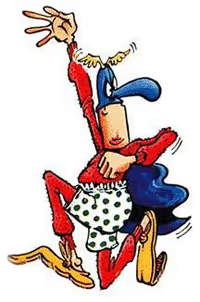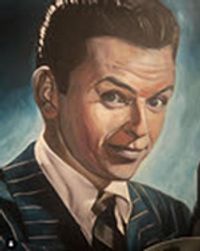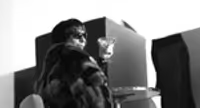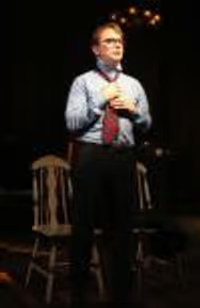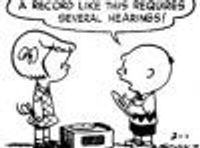The 50 best Broadway songs ever?
AdamFeldman
Swing Joined: 10/5/16
#1The 50 best Broadway songs ever?
Posted: 12/5/16 at 6:53pm
An impossible task, really, but we took a shot at a list:
https://www.timeout.com/newyork/theater/best-broadway-songs-of-all-time
Fire away!
Best,
Adam
#3The 50 best Broadway songs ever?
Posted: 12/6/16 at 6:45am
Yea, obviously no one is going to agree 100% with this (which is the point - to start a discussion), but this is a really good and well considered list.
green waver
Stand-by Joined: 11/3/16
#4The 50 best Broadway songs ever?
Posted: 12/6/16 at 1:52pm
Geez, what an overwhelming task! This list is generally pretty standard, with a few welcome quirks. All the chosen songs are good, and 80% are exceptionally good. I personally prefer "I Have Dreamed" over "Something Wonderful", "Sit Down, You're Rocking..." over "Adelelaide's Lament" and "Stars" over "one Day More", but that's just me. Impossible to be totally objective.
#5The 50 best Broadway songs ever?
Posted: 12/6/16 at 2:32pm
Really impressive list. Pleasantly surprised. What an abundance of riches!
GroupAGroup1
Understudy Joined: 12/30/14
#6The 50 best Broadway songs ever?
Posted: 12/6/16 at 2:34pm
Honestly, I've always thought "Rose's Turn," and GYPSY, were overrated: we all know about "stage mothers" and what they're like at this point, so GYPSY, to me, is just two-and-a-half hours of a now-tired idea.
And "Satisfied" at #7? (pause) REALLY? Forget that it's just not a very well-constructed song (it builds to a climax so thunderingly obvious, you keep waiting for something more): NUMBER SEVEN?
#7The 50 best Broadway songs ever?
Posted: 12/6/16 at 2:45pm
An impressive list. Nitpicking aside, my two major comments would be: At The Ballet should be much higher, and I would include Before The Parade Passes By rather than Hello, Dolly.
#8The 50 best Broadway songs ever?
Posted: 12/6/16 at 3:05pm
Ignoring the ranking (too big of a beast to tackle) personally, I would have chosen If I Loved You from Carousel instead of You'll Never Walk Alone. The latter is beautiful and emotionally high, but the delicate poignancy of If I Loved You so perfectly captures the nostalgia of overwhelming emotional attraction. The game of chicken for who'll drop the L-bomb first and is it too soon? I'll show you my heart if you show me yours. Personally, I think it's the most perfect love song ever written. R&H had already hit a home run with their previous effort at an arms-length love song with People Will Say We're In Love from Oklahoma, but when revisiting the theme, they outdid themselves.
And then I'd replace Ease On Down the Road with What Would I Do from Falsettos. There is no way I could leave that off any list of best Broadway songs ever.
barcelona20
Broadway Legend Joined: 1/19/08
#9The 50 best Broadway songs ever?
Posted: 12/6/16 at 3:13pm
Biggest omissions: Fable or The Light in the Piazza; Origin of Love
#10The 50 best Broadway songs ever?
Posted: 12/6/16 at 3:17pm
I have to say - in this Buzzfeed era, I have lost all interest in subjective lists.
green waver
Stand-by Joined: 11/3/16
#11The 50 best Broadway songs ever?
Posted: 12/6/16 at 6:30pm
And if I had to choose just one song from Chorus Line, I'd go with Nothing. Again, nothing against At the Ballet.
Mike66
Leading Actor Joined: 12/17/15
#12The 50 best Broadway songs ever?
Posted: 12/6/16 at 8:21pm
I am enjoying the list and the explanations a lot.
But one quibble (so far) -- in Carousel -- Billy certainly does not kill himself. What were you thinking?
#13The 50 best Broadway songs ever?
Posted: 12/6/16 at 8:47pm
So Mr. Sondheim has written ten percent of the top fifty Broadway songs ever written. And throw him in as lyricist for three more.
Cole Porter has written one of the top fifty Broadway songs, and number 46 at that.
It would be interesting to count the total covers of Mr Porter's songs versus the total covers of Mr. Sondheim's songs starting in 1970, which gives Mr. Sondheim the advantage since Cole Porter had written his last musical twenty years earlier.
I would guess that 10 - 1 would be a conservative starting point.
http://www.spectator.co.uk/2015/03/the-heckler-why-im-allergic-to-stephen-sondheim/
Just stirring the pot.
Broadway Geek2
Chorus Member Joined: 6/1/11
#16The 50 best Broadway songs ever?
Posted: 12/7/16 at 7:36am
"But one quibble (so far) -- in Carousel -- Billy certainly does not kill himself. What were you thinking?"
Actually, in the original stage version (and many versions thereafter) Billy does stab himself with his knife (rather than going to jail). Perhaps, you are used to the film version where Billy dies by accident. Check out Wikipedia or your favorite Broadway info. site for the original plot.
#17The 50 best Broadway songs ever?
Posted: 12/7/16 at 8:54am
Billy Bigelow, like Liliom, definitely kills himself, except in small-minded revised versions of the piece.
#18The 50 best Broadway songs ever?
Posted: 12/7/16 at 9:18am
The reason Porter ranks so low is because they've ranked this as "50 best Broadway songs, from integrated musicals, whose existence and popularity relates to their presence in show and not as standards/cabaret tunes." Porter wrote extensively for the theatre, but "Anything Goes" remains his primary integrated musical hit, and his footprint, like Noel Coward's, is arguably much bigger as a standard writer than as a show score composer.
#19The 50 best Broadway songs ever?
Posted: 12/7/16 at 10:07am
Kiss Me Kate and Silk Stockings were both also hits, and as "integrated" as anything else at the time.
And having seen unrevised productions of Fifty Million Frenchmen, Gay Divorce, Panama Hattie, Something For The Boys, and Can-Can, I can say that they, too are as "integrated" as other contemporary shows (and hits as well).
This idea that "integrated" musicals began with Oklahoma, really needs to be put to rest for good.
kreichelt
Understudy Joined: 1/29/13
#20The 50 best Broadway songs ever?
Posted: 12/7/16 at 10:43am
The list feels awfully old to me. Yikes, have there been no new musicals besides Hamilton since Les Mis?? Maybe I'm just partial to newer musicals, but I'd love to see more that's current or recent on there (aside from Satisified, which is not the best Hamilton song - give me Wait for It and Quiet Uptown, depending on my mood, and the odd though welcome choices Everyone's a Little Bit Racist and Totally F*cked - but are these really the best songs from these shows (There's a Fine, Fine Line and Left Behind perhaps?)
Other new musicals I'd pick over, for example, Wouldn't it Be Loverly (zzzzzz) might be: Waving Through a Window (Dear Evan Hansen), Dust and Ashes (Great Comet) and She Used to Be Mine (Waitress). From Next to Normal, I might pick Superboy and the Invisible Girl or I Miss the Mountains). From Last Five Years I'd take Goodbye Until Tomorrow. There are even some great songs in American Psycho (I'll Be Back, This is Not an Exit, The Girl Before). Bare, Hunchback and Heathers were off-Broadway, but still All Grown Up and Are You There (Bare), Lifeboat (Heathers) and Hellfire (Hunchback) all beat out most of the list.
There's been some great stuff in the last 30 years.
Updated On: 12/7/16 at 10:43 AM
#21The 50 best Broadway songs ever?
Posted: 12/7/16 at 11:22am
Good list. But I would add "Who I'd be" from Shrek.
#22The 50 best Broadway songs ever?
Posted: 12/7/16 at 12:00pm
darquegk said: "The reason Porter ranks so low is because they've ranked this as "50 best Broadway songs, from integrated musicals, whose existence and popularity relates to their presence in show and not as standards/cabaret tunes." Porter wrote extensively for the theatre, but "Anything Goes" remains his primary integrated musical hit, and his footprint, like Noel Coward's, is arguably much bigger as a standard writer than as a show score composer.
"
I think that you are on shaky ground with that premise. Has an old song lost its Broadway connection because it was written for a Ziegfeld musical extravaganza or because its show is old and/or had a forgettable book.
As far back as 1917, Jerome Kern and P.G. Wodehouse, in response to the splashy musicals, were producing small, plot and character driven musicals at the small Princess Theater. The biggest hit was "Oh, Boy." The score, which included the Kern classic “Till the Clouds Roll By,” helped push the plot along, the book offered genuine characters pursuing their objectives and the lyrics functioned on various levels. I don't think that many could tell you the musical with which "Til the Clouds Roll By" is associated.
If you are going to use this criterion, I think you have to have a good knowledge of theater history. Kiss Me, Kate won the Tony for best musical in 1949 I think. There was a major revival of "Kiss Me, Kate" in 1999 starring Marin Mazzie and Brian Stokes Mitchell.
Nevertheless, it is a colorful and useful list with a good background accompanying all the songs.
Updated On: 12/7/16 at 12:00 PM
#23The 50 best Broadway songs ever?
Posted: 12/7/16 at 12:04pm
I'm familiar with the concept of the Princess Theatre musicals and Wodehouse's pre-R&H codification of the genre, but regardless of their individual merits or qualities, history has sort of condemned them to a footnote, rather than an examined era. It's a bit of a shame.
#24The 50 best Broadway songs ever?
Posted: 12/7/16 at 12:08pm
"I'm familiar with the concept of the Princess Theatre musicals and Wodehouse's pre-R&H codification of the genre, but regardless of their individual merits or qualities, history has sort of condemned them to a footnote..."
Lazy history, yes; but there are many among us who care about theatre enough to actually do a little reading and find out how it became what it is. Journalists, however, rarely are among that number.
#25The 50 best Broadway songs ever?
Posted: 12/7/16 at 11:45pm
The Princess Theater musicals are now a century old. In 2027, if Broadway and the rest of the nation are still around, The centennial of Show Boat should draw a lot of attention to the development of the musical theater. It is only natural for the young to prize the songs to which they grew up the most. As they grow older and experience more of the classics, they will make room for many of the older songs.
I was very pleased to see "Ol' Man River" given such a lofty spot. When I first heard Frank Sinatra sing this song at the conclusion of the Jerome Kern biopic, I was appalled that a skinny white boy would even attempt to sing a song reserved for African American bass, and the multi-acclaimed Paul Robeson in particular.
But Ol' Blue Eyes kept the song in his catalog and came to sing it very well, for a white man. At a Carnegie Hall benefit, as corroborated by daughter Nancy, he brought tears to the eyes of Martin Luther King.
Videos





